Smart IoT Based System for Monitoring and Detecting Fuel Theft and Fuel Indication for Refilling Process
DOI:
https://doi.org/10.5281/zenodo.8068149Keywords:
Fuel level sensor, GPS Tracking, Fuel theft detection, Ultrasonic sensorAbstract
Theft of fuel in vehicles is a prevalent issue in many regions, leading to financial losses for vehicle owners and fuel stations. To address this problem, a smart fueling system is proposed that utilizes sensors to detect fuel theft and alert the vehicle owner. The system incorporates an analog-based fuel status check before and after refueling to ensure accurate fuel measurement. Additionally, GPS technology is employed to determine when a vehicle enters reserve mode and the system displays the nearest fuel station. The implementation of such a smart fueling system has the potential to significantly reduce fuel fraud incidents and improve the overall security and efficiency of the fueling process in vehicles.
References
AlkaGaba, N. G. (2013). Review over Diverse Location Aided Routing. Global Journal for Current Engineering Research, 2(2), 141-144.
Nagaraja, B. G., Rayappa, R., Mahesh, M., Patil, C. M., & Manjunath, T. C. (2009, January). Design & development of a GSM based vehicle theft control system. In 2009 International conference on advanced computer control (pp. 148-152). IEEE.
Huang, H., Xiao, S., Meng, X., & Xiong, Y. (2010, April). A remote home security system based on wireless sensor network and GSM technology. In 2010 Second International Conference on Networks Security, Wireless Communications and Trusted Computing (Vol. 1, pp. 535-538). IEEE.
Ahmed, S. T. (2017, June). A study on multi objective optimal clustering techniques for medical datasets. In 2017 international conference on intelligent computing and control systems (ICICCS) (pp. 174-177). IEEE.
Varghese, J. C., & Balachandran, B. E. (2013). Low Cost Intelligent Real Time Fuel Mileage Indicator for Motorbikes. International Journal of Innovative Technology and Exploring Engineering, 2(5), 97-107.
Kumar, N. P. (2014). International Journal of Research in Advent Technology. International Journal of Research, 2(1).
BHARATHI, S. (2022). IOT VEHICLE FUEL THEFT DETECTION SYSTEM USING ARDUINO.
Jade, N., Shrimali, P., Patel, A., & Gupta, S. (2014). Modified type intelligent digital fuel indicator system. IOSR Journal of Mechanical and Civil Engineering (IOSR-JMCE) e-Issn, 2278-1684.
Sharma, A., Sharma, P., Bhardwaj, D., Mishra, D., & Soni, A. (2016). Load Cell Based Fuel Theft Detection System. J. Electron. Commun. Syst, 1(3).
Avvari, G. V., Pattipati, B., Balasingam, B., Pattipati, K. R., & Bar-Shalom, Y. (2015). Experimental set-up and procedures to test and validate battery fuel gauge algorithms. Applied energy, 160, 404-418.
Maarof, M. I., Samoh, E., Girma, T. C., & Rishan, M. (2018). Development of an after-market universal fuel gauge for motorcycle. International Journal of Mechanical Engineering and Technology, 9(8), 391-396.
Ahmed, S. T., Sreedhar Kumar, S., Anusha, B., Bhumika, P., Gunashree, M., & Ishwarya, B. (2020). A generalized study on data mining and clustering algorithms. New Trends in Computational Vision and Bio-inspired Computing: Selected works presented at the ICCVBIC 2018, Coimbatore, India, 1121-1129.
Raja, D. K., Kumar, G. H., Basha, S. M., & Ahmed, S. T. (2022). Recommendations based on integrated matrix time decomposition and clustering optimization. International Journal of Performability Engineering, 18(4), 298.
Downloads
Published
How to Cite
Issue
Section
License
Copyright (c) 2023 N Yamini, R Bharath Kumar, J Sheik Mohamed, N Ch S N Iyengar

This work is licensed under a Creative Commons Attribution-NonCommercial-NoDerivatives 4.0 International License.







